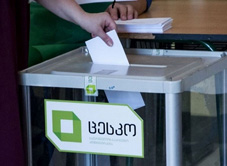
Report about upcoming Elections
By Tatia Megeneishvili
Friday, June 3
The Organization for Security and Co-operation in Europe (OSCE) Office for Democratic Institutions and Human Rights (ODIHR) released its 11-page report about the pre-election situation in Georgia on June 2.
According to the report, the OSCE conducted its survey in Tbilisi from 26 to 29 April with a Needs Assessment Mission (NAM). Meetings were held with officials from state institutions, as well as with representatives of political parties, the media, civil society, and international organizations.
The next parliamentary elections in Georgia are to be held in October 2016. The elections will elect the 150-member parliament through a mixed electoral system with 77 members elected proportionally through nationwide constituency and 73 through single mandate constituencies.
Elections will be administered by three levels of election administration, headed by the Central Election Commission (CEC).
According to the report, most OSCE/ODIHR NAM interlocutors expressed confidence and trust in the work of the CEC and noted its overall transparent and professional approach.
“However, some specific concerns were expressed regarding the transparency of the recruitment process for mid-level election administration staff. Voter registration is passive and centralized, and the process is being modified to include biometric data. The OSCE/ODIHR NAM interlocutors expressed overall confidence in the quality of voter lists and the ability of responsible institutions to administer them properly,” reads the report.
According to the document, the media environment is diverse but characterized by significant politicization and polarization.
“Concerns were noted to the OSCE/ODIHR NAM about ongoing court proceedings over the ownership of the broadcaster Rustavi 2 as well as about instances of alleged pressure on several prominent television hosts and journalists, which contributes to a challenging environment in which to cover the elections,” the report says.
According to the OSCE report, several political party representatives noted potential limitations in their ability to campaign freely, citing concerns over pressure on candidates and their supporters.
“They also raised concerns regarding the possible misuse of administrative resources, especially in more remote areas and those populated with national minorities. Some OSCE/ODIHR interlocutors mentioned a potential risk of security services and local authorities exerting pressure on voters,” reads the report.
The document also touched upon the Citizen Observer groups.
“Citizen Observer groups plan to undertake a number of election-related activities, including long and short-term observation, as well as monitoring the media and campaign finance. OSCE/ODIHR NAM interlocutors noted the positive role played by civil society, but also expressed concern about the potentially large numbers of observers present at polling stations, which could impact the work of polling staff,” reads the report.
According to the report, particular concerns were raised over the conduct of the campaign, and especially with regard to possible pressure on contestants and voters and a potential misuse of administrative resources.
“Stakeholders requested the deployment of a robust and lengthy mission to ensure sufficient nationwide coverage with an emphasis on areas populated with national minorities,” reads the report.
The report concludes by saying that OSCE/ODIHR NAM recommends the secondment of 28 long-term observers from OSCE participating States to follow the electoral process countrywide, and 350 short-term observers to follow election day proceedings. In line with OSCE/ODIHR’s standard methodology, the EOM would also include a media monitoring element.
The OSCE/ODIHR has previously observed twelve elections in Georgia.


